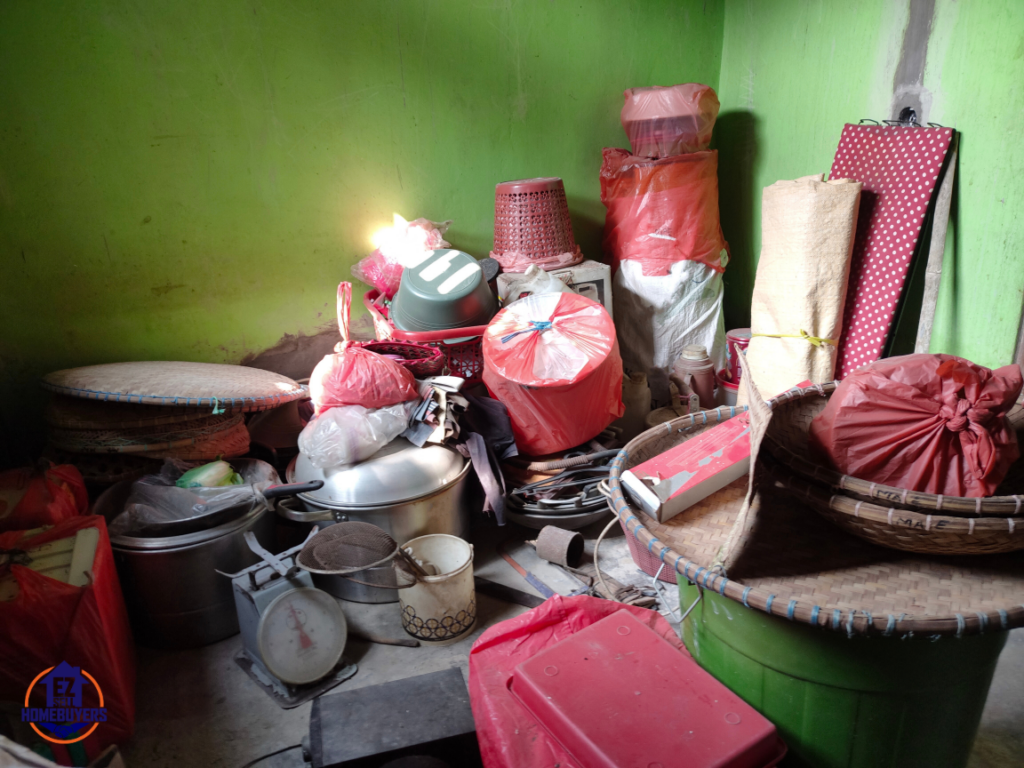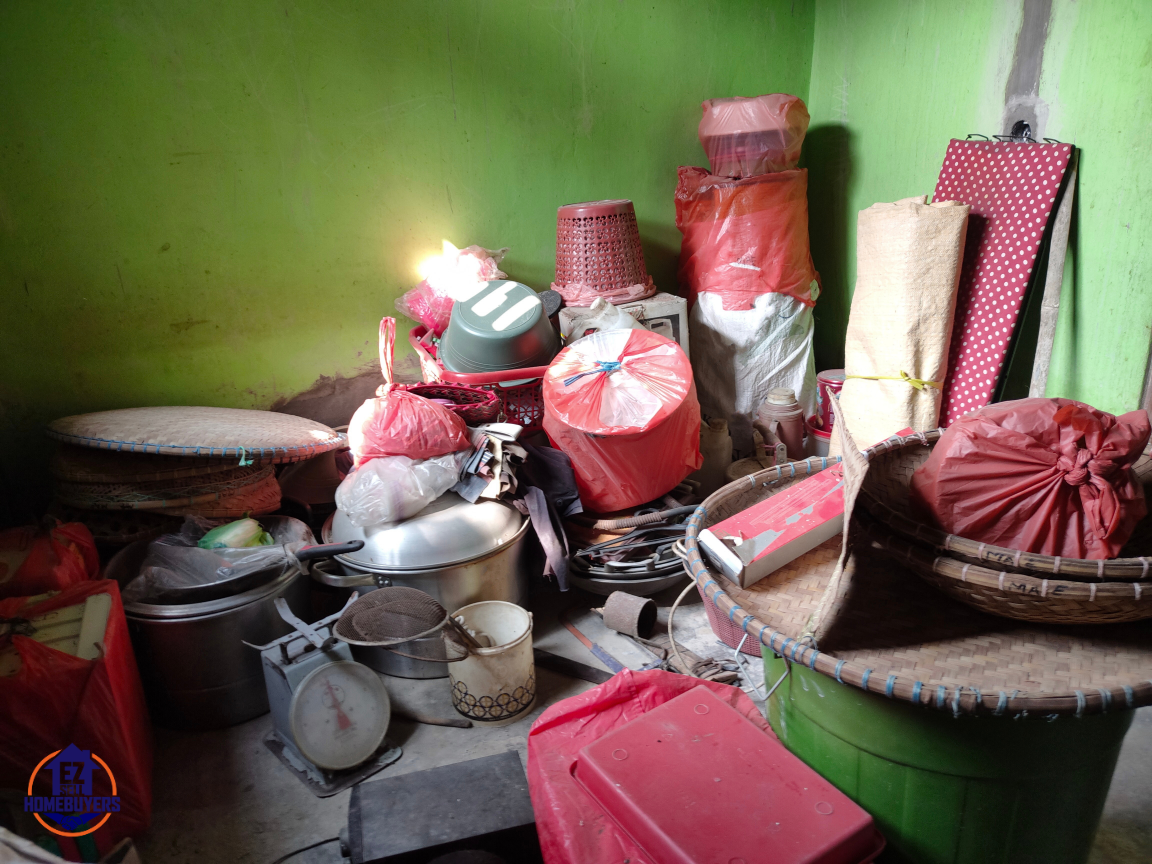Hoarding isn’t just a personal challenge; it can create severe safety and health risks, turning a house into a hazardous place. In Ohio, hoarding can result in a home being condemned if it reaches a level that poses significant dangers. But what does it take for a property to be condemned due to hoarding, and what are the laws surrounding this in Ohio? Let’s dive into the details and explore possible solutions.

Understanding Hoarding and Its Consequences
Hoarding is characterized by an individual’s excessive accumulation of items, leading to cramped living conditions, blocked pathways, and overwhelming clutter. Hoarding can impact more than just the homeowner; it can create health and safety risks for neighbors and affect property values in the area. The biggest concern in Ohio and other states is whether the hoarding situation poses a threat to the safety of the occupants or the general public.
When a property is heavily affected by hoarding, it becomes vulnerable to numerous hazards, including:
- Fire hazards: Clutter blocks exits, increases fire load, and makes escape routes inaccessible.
- Structural issues: Overloading of floors and walls can compromise the structural integrity of the house.
- Health risks: Accumulation of trash, mold, and pests can lead to serious health problems.
Can a House Be Condemned for Hoarding in Ohio?
Yes, a house can be condemned for hoarding in Ohio if it violates local health and safety regulations. The Ohio Revised Code Section 3707.01 gives local health departments the authority to declare properties unsafe if they pose risks to public safety or health. A condemned home means that occupants must vacate the premises, and further occupation can result in fines or legal action. In cases of severe hoarding, local authorities often intervene when complaints are received or when the situation becomes visibly hazardous.
Ohio Hoarding Laws and Health Department Regulations
Ohio’s health department guidelines specify that homes can be condemned if they pose significant safety or health risks to residents or neighbors. According to the Ohio Revised Code Section 3707.01, local authorities have the power to declare properties unfit for habitation if they present issues such as:
- Fire code violations: Hoarding that obstructs escape routes, increases fire load, or creates ignition risks can lead to immediate safety concerns. “Fire hazards are a top reason for condemnation in hoarding cases,” says Larry Moore Jr., a housing inspector with the Montgomery County Health Department.
- Health risks: Properties infested with pests, mold, or waste buildup may receive health code violations, as stated in Ohio Department of Health Guidelines. Health inspectors can issue orders to address these risks or require vacating the property.
- Structural concerns: Overloading floors and walls with accumulated items can compromise the building’s integrity, making it uninhabitable.
Ohio law prioritizes public health and safety, and local authorities have the right to enforce cleanup orders or issue condemnation notices when homes fail to comply. You can find more information on the Ohio Department of Health’s website.
How a Home Gets Condemned in Ohio for Hoarding
Condemnation in Ohio is often the result of inspections that follow a complaint or noticeable signs of danger. From my experience, here’s how the process typically unfolds:
- Complaint and Inspection: If neighbors or other concerned individuals report potential hoarding conditions, local authorities may conduct an inspection. This inspection is usually led by county health department officials or code enforcement officers.
- Assessment of Hazards: Inspectors evaluate the property using health and safety codes established by the Ohio Department of Health. They look for fire hazards, health risks, or structural concerns. For example, according to Ohio Revised Code Section 3707.02, health inspectors assess risks like blocked exits or mold infestations.
- Issuance of Orders: When violations are found, health inspectors issue orders to the homeowner, which often include cleaning up, resolving infestations, or making repairs. The homeowner is given a timeline to comply.
- Condemnation Notice: If the violations are not resolved within the specified period, the county may declare the home officially condemned. At this point, occupants must vacate the property.
- Legal Action and Cleanup: In severe situations, the health department may take legal action to enforce vacating the property and initiate cleanup. As seen in a case I encountered in 2022 in Dayton, failure to comply can result in fines and forced eviction.
For further details, you can review Ohio’s specific regulations on public health and safety at the Ohio Department of Health website or consult an experienced local real estate attorney.
Legal Consequences of Hoarding in Ohio
In Ohio, homeowners can face significant legal consequences if their property is condemned due to hoarding. Some of the main repercussions include:
- Fines and Penalties: Homeowners who fail to comply with health department orders could be fined on a daily basis until the violations are corrected. According to the Ohio Revised Code Section 3767.01, these fines can accumulate quickly, creating a financial burden.
- Forced Eviction: If conditions are deemed unsafe, the health department may issue an eviction notice, requiring all occupants to leave the property. In one instance I’ve dealt with, a homeowner was given just 48 hours to vacate.
- Property Demolition: In cases where the property poses a severe public hazard or is beyond repair, authorities may order its demolition. This is generally a last resort but can occur if cleanup and repair orders are ignored.
Ohio’s laws are stringent when it comes to public health and safety. Homeowners should stay proactive, regularly maintaining their properties and addressing hoarding issues early to avoid these legal troubles. To read the official guidelines, you can visit the Ohio Revised Code.
How to Prevent a Home from Being Condemned
Addressing hoarding behaviors early is crucial to preventing condemnation. Here are some steps homeowners in Ohio can take to avoid this situation:
- Seek Professional Help: If hoarding is a problem, reaching out to mental health professionals, such as therapists specializing in hoarding disorder, is essential. They can offer the necessary support to manage and control hoarding tendencies.
- Regular Maintenance and Cleaning: Schedule routine clean-ups and inspections to ensure that clutter doesn’t accumulate to hazardous levels. Consider working with professional organizers to help manage and maintain order in the home.
- Repair and Safety Checks: Perform regular repairs to keep the house safe and structurally sound. Ensure all egress points are clear and that fire hazards are minimized.
- Understand Ohio’s Hoarding Laws: Being aware of Ohio’s health and safety regulations can help homeowners stay compliant and avoid citations and fines.
A Solution for Selling a Hoarder House: Selling to a Cash Investor
If you or someone you know owns a hoarder house in Ohio that’s at risk of being condemned, selling the house to a cash investor could be a smart solution. Cash investors specialize in buying properties in as-is condition, meaning you won’t have to go through the hassle of cleaning or making repairs. They can make the process quick and straightforward, allowing you to avoid the financial and legal consequences of condemnation.
As a real estate investor with over 23 years of experience, I’ve worked with many homeowners facing challenging situations like this. Selling to a cash investor allows you to walk away from a tough situation with cash in hand and peace of mind. You can find local cash buyers in Ohio by searching for We Buy Houses companies or reaching out to trusted real estate professionals.
Final Thoughts
In Ohio, a house can be condemned for hoarding if it poses a significant safety or health risk to the occupants or the surrounding community. Understanding the consequences of hoarding and the potential for condemnation is essential for homeowners. Knowing Ohio’s laws and working proactively to address hoarding issues can save property owners from legal troubles and ensure a safe living environment.
If you or someone you know is struggling with hoarding in Ohio, consider reaching out to local resources or mental health professionals to address the issue before it escalates. Awareness and action are key to preventing homes from being condemned due to hoarding.
By staying informed and proactive, Ohio homeowners can avoid the severe consequences that come with property condemnation due to hoarding. And if you need a way out, selling to a cash investor might be the lifeline you need to move forward.
FAQ: Can a House Be Condemned for Hoarding in Ohio?
1. Can a house be condemned for hoarding in Ohio?
Yes, a house can be condemned for hoarding in Ohio if it poses a significant health or safety risk. Condemnation occurs when a property is declared unfit for human habitation due to conditions like fire hazards, health risks, or structural damage caused by hoarding.
2. What are the main reasons a house might be condemned due to hoarding?
Homes can be condemned for hoarding due to several reasons, including:
- Fire code violations, such as blocked exits or increased fire load.
- Health risks caused by infestations, mold growth, or waste buildup.
- Structural concerns where excessive weight or accumulated items compromise the integrity of the house.
3. What happens when a house is condemned in Ohio?
When a house is condemned, the local health department issues a notice that requires the occupants to vacate the property immediately. Fines and legal consequences can follow if the homeowner does not comply with orders to address the issues or vacate the premises.
4. How does the condemnation process start in Ohio?
The process typically begins with a complaint or a report of visible hazards. This triggers an inspection by the county health department or code enforcement officials. If violations are found, orders are issued to the homeowner to correct the problems. Failure to comply within a specified period may result in a formal condemnation notice.
5. What legal consequences can homeowners face if their house is condemned?
Homeowners can face daily fines for non-compliance, forced eviction, and in extreme cases, property demolition if the house is beyond repair or poses a public safety risk. Condemnation can lead to significant financial and legal troubles if not addressed promptly.
6. How can homeowners in Ohio prevent their house from being condemned due to hoarding?
Homeowners can prevent condemnation by:
- Seeking professional help for hoarding disorders.
- Regularly cleaning and maintaining their property.
- Performing routine safety and repair checks.
- Understanding and adhering to Ohio’s health and safety laws to stay compliant.
7. What is a practical solution for homeowners with a hoarder house at risk of condemnation?
One practical solution is selling the house to a cash investor. Cash investors buy homes in as-is condition, allowing homeowners to avoid the costs and challenges of cleanup or repairs. Selling to a cash buyer can provide a quick exit strategy and prevent further financial or legal consequences.
8. Where can homeowners find more information about Ohio’s hoarding and condemnation laws?
Homeowners can visit the Ohio Department of Health website or review specific sections of the Ohio Revised Code related to public health and safety. Consulting with a local real estate attorney or professional can also provide valuable guidance.

